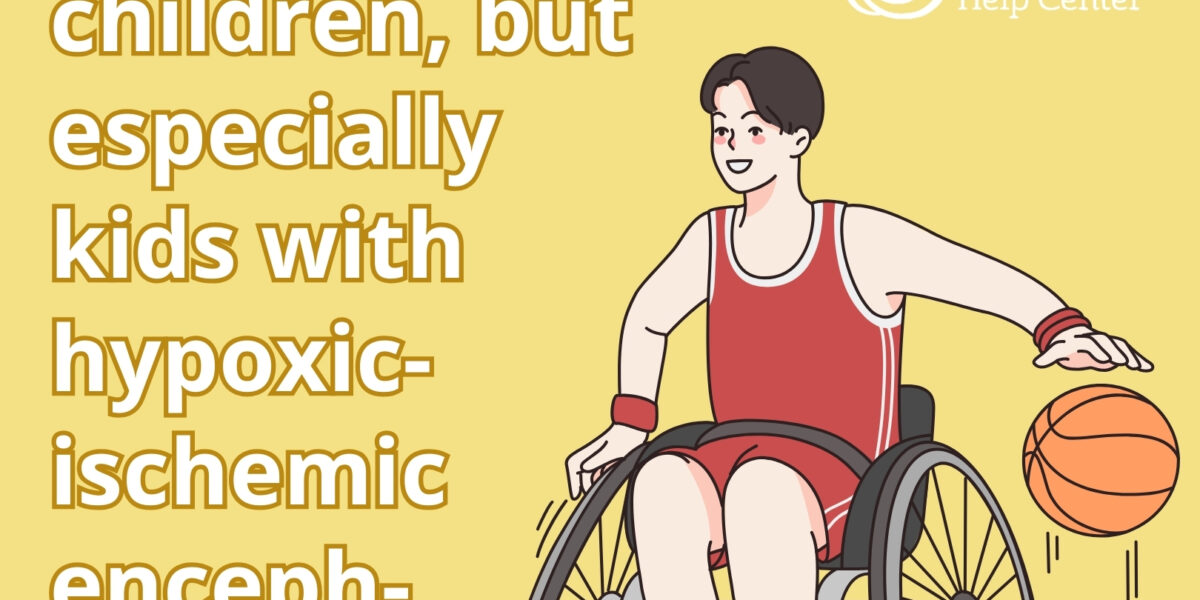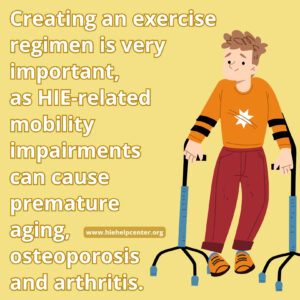There are many habits that feed into the concept of general health and fitness, the three largest categories involve:
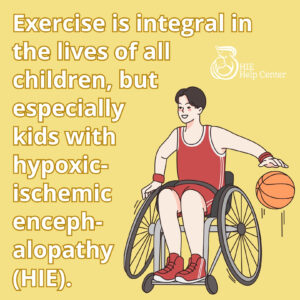 Exercise
Exercise- Sleep
- Diet
Other environmental factors are also significant, including:
- Socioeconomic status
- Education level
- Health insurance coverage
- Access to medical & healthcare services
- Presence of support networks within the community
Although maintaining health and fitness is of concern for all individuals, parents should pay special attention to the unique needs of their child as they may have additional needs that must be addressed in the context of their HIE-related diagnoses.
Mobility and HIE
Health and fitness are important in the life of all children, but there are often additional considerations that parents should take into account if their child has disabilities relating to hypoxic-ischemic encephalopathy (HIE).
Children with HIE are more likely to have cerebral palsy, which can have secondary effects on their mobility and spasticity. However, there are ways to adapt fitness regimens to a child’s abilities to help them maintain strength, flexibility, balance, and/or range of motion.
Maintaining mobility can also help to stave off aging-associated conditions such as:
- Cardiovascular deterioration
- Respiratory issues
- Diabetes
- Osteoporosis/arthritis
- High blood pressure
- Obesity
- Heart disease
Exercise Regimens for HIE
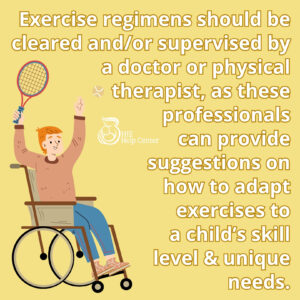 Exercise regimens should be cleared and/or supervised by a physician, physical therapist or other medical professional, as these professionals can help provide suggestions regarding how to adapt exercises to a child’s skill levels. This is very important, as the mobility impairments that can attend HIE can sometimes cause premature aging, osteoporosis and arthritis, as the body is subjected to additional stresses and strains. However, in many cases, these effects may be mitigated with proper medical supervision, exercise and fitness regimens.
Exercise regimens should be cleared and/or supervised by a physician, physical therapist or other medical professional, as these professionals can help provide suggestions regarding how to adapt exercises to a child’s skill levels. This is very important, as the mobility impairments that can attend HIE can sometimes cause premature aging, osteoporosis and arthritis, as the body is subjected to additional stresses and strains. However, in many cases, these effects may be mitigated with proper medical supervision, exercise and fitness regimens.
Generally, for adults, the recommendation is 30 minutes of activity a day at least five days a week. For children, the recommendation is an hour of activity every day, in order to improve cardiovascular health, increase strength, improve flexibility, maintain a healthy weight and balance blood pressure and cholesterol.
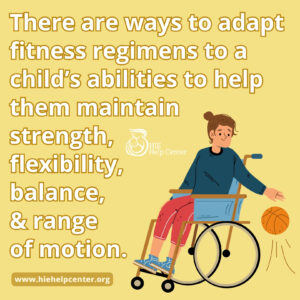 Exercise regimens should take into account aerobic, anaerobic and muscle-strengthening exercises. To learn more about the kinds of exercises needed for health maintenance, please see this review article of physical fitness in cerebral palsy for more details. For individuals who are nonambulatory or inactive, range-of-motion exercises can still provide exercise, increasing the joint’s’ ability to move without impairment. Other options for exercise regimens can be found on physiopedia, the Encyclopedia of Physiotherapy.
Exercise regimens should take into account aerobic, anaerobic and muscle-strengthening exercises. To learn more about the kinds of exercises needed for health maintenance, please see this review article of physical fitness in cerebral palsy for more details. For individuals who are nonambulatory or inactive, range-of-motion exercises can still provide exercise, increasing the joint’s’ ability to move without impairment. Other options for exercise regimens can be found on physiopedia, the Encyclopedia of Physiotherapy.
Diet and HIE
A child’s dietary needs can vary significantly, which means that making one-size-fits-all recommendations is rarely useful. Consult with an accredited nutritionist or dietitian; they can provide you with guidelines regarding the best ways to provide your child with proper nutrition. To see more on dietary concerns, please see our page on diet, nutrition and feeding. One of the key components of dietary balance is ensuring that children get the proper amount of nutrients, vitamins and minerals to ensure healthy development. Generally, a healthy diet will have lean proteins, fresh fruits and vegetables, whole grains, milk and limited quantities of lipids (fats), though relative quantities may vary depending on a child’s unique situation. In certain cases, children may be placed on diets with specific guidelines regarding the relative quantities of different types of macronutrients, such as the ketogenic diet for intractable seizures/epilepsy.
Learn more about diet and cerebral palsy (commonly associated with HIE):
Sleep and HIE
The developing brain and body need sleep in order to ensure optimal cognitive function, mood, and other health-related considerations. Each developmental stage of life is accompanied by different physiological needs for sleep. For example, young infants have very different sleep habits than teenagers, and teenagers have different sleep patterns than older adults over the age of 65. While an individual’s sleep needs may vary, generally, the National Sleep Foundation recommends the following amounts of sleep, summarized in a single neat chart:
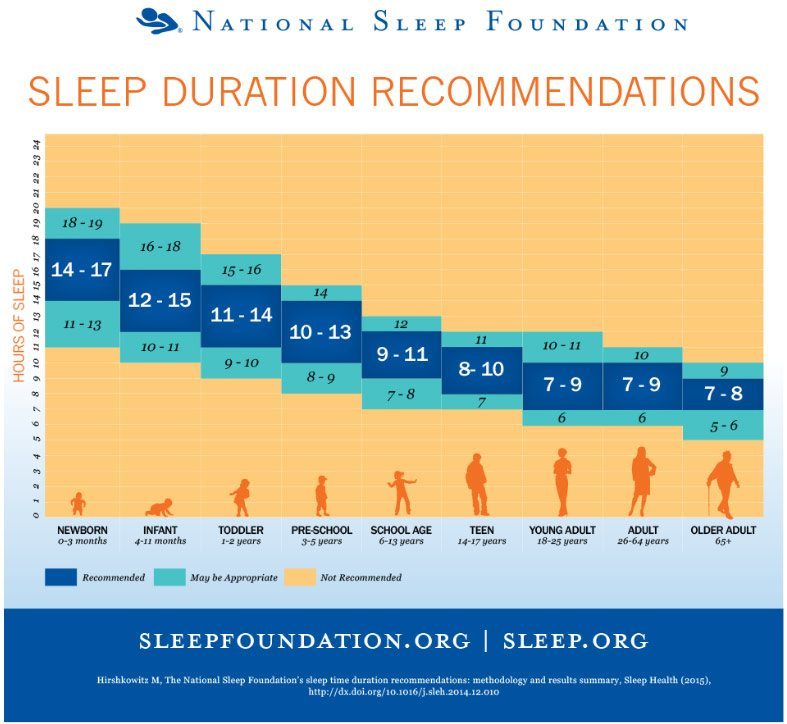
Source: Hirshkowitz M. The National Sleep Foundation’s sleep time duration recommendations: methodology and results summary. Sleep Health (2015).
Although the chart summarizes key recommendations, sometimes sleep patterns may be disturbed in children with HIE, whether it is due to neurological issues, gastrointestinal distress, pain, or other considerations. Parents should consult with their child’s pediatrician or primary care physician regarding any concerns they may have about how much, how long, or how well their child is sleeping. Physicians may recommend some interventions or changes in habits, environment, mattress type, or other factors to help ensure the child is able to get sufficient restful sleep.
Do you need someone to talk to?
Your child was just diagnosed with HIE and your head is spinning with what may feel like a thousand different things. It can be difficult to make sense of everything that has happened.
As you start to research exactly what your child’s diagnosis means, you may be bombarded with facts, information, and advice – you may be lost as to where to turn next.
We want to hear your story. HIE Help Center is owned by ABC Law Centers, a birth injury law firm helping families since 1997. Our intake team is here to listen to every detail of what you and your family may have gone through during labor and delivery. Although we are not doctors and cannot provide medical advice, our team can provide resources specifically tailored to your situation. Our team is trained to recognize if there may have been medical malpractice that lead to your child’s diagnosis, and we can advise if taking legal action may be beneficial to you and your family.
Call us at (888) 329-0122 to speak with a member of our intake team.

